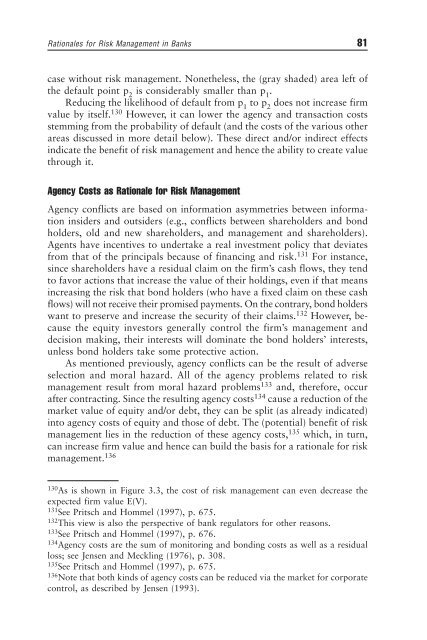Risk Management and Value Creation in ... - Arabictrader.com
Risk Management and Value Creation in ... - Arabictrader.com
Risk Management and Value Creation in ... - Arabictrader.com
Create successful ePaper yourself
Turn your PDF publications into a flip-book with our unique Google optimized e-Paper software.
Rationales for <strong>Risk</strong> <strong>Management</strong> <strong>in</strong> Banks 81<br />
case without risk management. Nonetheless, the (gray shaded) area left of<br />
the default po<strong>in</strong>t p 2<br />
is considerably smaller than p 1<br />
.<br />
Reduc<strong>in</strong>g the likelihood of default from p 1<br />
to p 2<br />
does not <strong>in</strong>crease firm<br />
value by itself. 130 However, it can lower the agency <strong>and</strong> transaction costs<br />
stemm<strong>in</strong>g from the probability of default (<strong>and</strong> the costs of the various other<br />
areas discussed <strong>in</strong> more detail below). These direct <strong>and</strong>/or <strong>in</strong>direct effects<br />
<strong>in</strong>dicate the benefit of risk management <strong>and</strong> hence the ability to create value<br />
through it.<br />
Agency Costs as Rationale for <strong>Risk</strong> <strong>Management</strong><br />
Agency conflicts are based on <strong>in</strong>formation asymmetries between <strong>in</strong>formation<br />
<strong>in</strong>siders <strong>and</strong> outsiders (e.g., conflicts between shareholders <strong>and</strong> bond<br />
holders, old <strong>and</strong> new shareholders, <strong>and</strong> management <strong>and</strong> shareholders).<br />
Agents have <strong>in</strong>centives to undertake a real <strong>in</strong>vestment policy that deviates<br />
from that of the pr<strong>in</strong>cipals because of f<strong>in</strong>anc<strong>in</strong>g <strong>and</strong> risk. 131 For <strong>in</strong>stance,<br />
s<strong>in</strong>ce shareholders have a residual claim on the firm’s cash flows, they tend<br />
to favor actions that <strong>in</strong>crease the value of their hold<strong>in</strong>gs, even if that means<br />
<strong>in</strong>creas<strong>in</strong>g the risk that bond holders (who have a fixed claim on these cash<br />
flows) will not receive their promised payments. On the contrary, bond holders<br />
want to preserve <strong>and</strong> <strong>in</strong>crease the security of their claims. 132 However, because<br />
the equity <strong>in</strong>vestors generally control the firm’s management <strong>and</strong><br />
decision mak<strong>in</strong>g, their <strong>in</strong>terests will dom<strong>in</strong>ate the bond holders’ <strong>in</strong>terests,<br />
unless bond holders take some protective action.<br />
As mentioned previously, agency conflicts can be the result of adverse<br />
selection <strong>and</strong> moral hazard. All of the agency problems related to risk<br />
management result from moral hazard problems 133 <strong>and</strong>, therefore, occur<br />
after contract<strong>in</strong>g. S<strong>in</strong>ce the result<strong>in</strong>g agency costs 134 cause a reduction of the<br />
market value of equity <strong>and</strong>/or debt, they can be split (as already <strong>in</strong>dicated)<br />
<strong>in</strong>to agency costs of equity <strong>and</strong> those of debt. The (potential) benefit of risk<br />
management lies <strong>in</strong> the reduction of these agency costs, 135 which, <strong>in</strong> turn,<br />
can <strong>in</strong>crease firm value <strong>and</strong> hence can build the basis for a rationale for risk<br />
management. 136<br />
130 As is shown <strong>in</strong> Figure 3.3, the cost of risk management can even decrease the<br />
expected firm value E(V).<br />
131 See Pritsch <strong>and</strong> Hommel (1997), p. 675.<br />
132 This view is also the perspective of bank regulators for other reasons.<br />
133 See Pritsch <strong>and</strong> Hommel (1997), p. 676.<br />
134 Agency costs are the sum of monitor<strong>in</strong>g <strong>and</strong> bond<strong>in</strong>g costs as well as a residual<br />
loss; see Jensen <strong>and</strong> Meckl<strong>in</strong>g (1976), p. 308.<br />
135 See Pritsch <strong>and</strong> Hommel (1997), p. 675.<br />
136 Note that both k<strong>in</strong>ds of agency costs can be reduced via the market for corporate<br />
control, as described by Jensen (1993).










